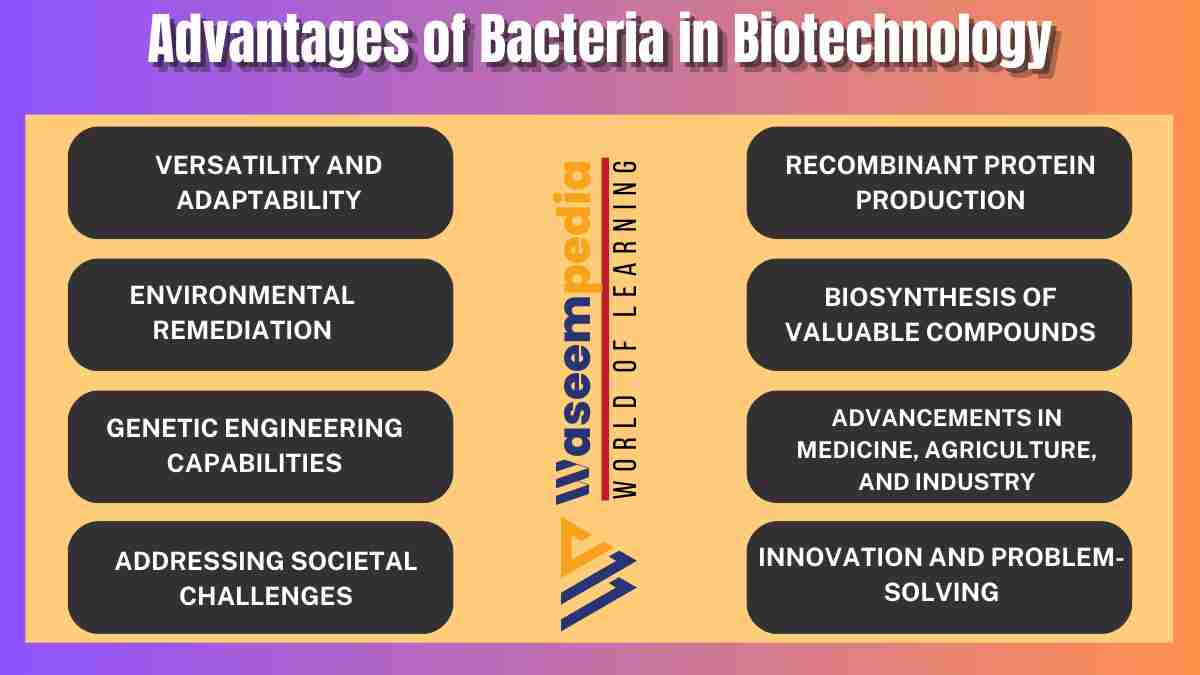Bacteria, the diverse and adaptable microorganisms, have become indispensable in the field of biotechnology. Their unique biological characteristics and metabolic capabilities make them ideal candidates for a wide range of applications in various industries.
From medicine and agriculture to environmental remediation and industrial manufacturing, bacteria play a vital role in advancing scientific discoveries, developing innovative products, and addressing societal challenges.
Bacteria possess several advantages in biotechnology, making them invaluable in scientific advancements, product development, and problem-solving.
Their versatility, adaptability, and genetic manipulability enable a wide range of applications, including recombinant protein production, bioremediation, biosynthesis of chemicals and pharmaceuticals, and genetic engineering.
By harnessing the power of bacteria, biotechnologists continue to push the boundaries of innovation, contributing to advancements in medicine, agriculture, environmental protection, and industrial manufacturing.
In this article, we will explore the advantages of bacteria in biotechnology and highlight their significant contributions to the field.
Introduction Advantages of Bacteria in Biotechnology
Biotechnology harnesses the power of living organisms, such as bacteria, to develop technologies and products that benefit society. Bacteria offer several advantages in biotechnology due to their versatility, adaptability, and ability to perform complex metabolic processes.
Their unique characteristics make them valuable tools in various applications, enabling advancements in medicine, agriculture, environmental protection, and industrial manufacturing.
1. Versatility and Adaptability
Bacteria exhibit remarkable versatility and adaptability, allowing them to thrive in diverse environments. This adaptability extends to the laboratory, where scientists can easily culture and manipulate bacterial cells.
Bacteria can be genetically modified, making them excellent candidates for various biotechnological processes and applications.
2. Production of Recombinant Proteins
Bacteria are widely used for the production of recombinant proteins, including therapeutic proteins, enzymes, and industrial proteins. Through genetic engineering, scientists can introduce specific genes into bacteria, enabling them to produce large quantities of desired proteins.
This approach offers a cost-effective and scalable method for protein production, benefiting fields such as medicine, research, and industrial manufacturing.
3. Bioremediation and Environmental Applications
Bacteria are instrumental in bioremediation, the process of using living organisms to degrade and remove pollutants from the environment. Certain bacteria possess the ability to break down toxic substances, such as oil spills and industrial waste, into less harmful compounds.
By harnessing the metabolic capabilities of bacteria, biotechnologists can develop environmentally friendly solutions for cleaning up contaminated sites and restoring ecosystems.
4. Biosynthesis of Chemicals and Pharmaceuticals
Bacteria serve as powerful biosynthetic factories for the production of chemicals and pharmaceuticals. Through genetic engineering, bacteria can be engineered to synthesize complex molecules, such as antibiotics, vitamins, and biofuels.
This approach offers a sustainable and scalable method for the production of valuable compounds, reducing reliance on traditional chemical synthesis and providing greener alternatives.
5. Genetic Engineering and Manipulation
The ability to manipulate bacterial genetics is a significant advantage in biotechnology. Bacteria can be engineered to produce specific enzymes, metabolites, and proteins with desired properties.
Genetic engineering techniques, such as gene editing and gene expression regulation, allow scientists to fine-tune bacterial behavior and optimize metabolic pathways. This capability opens up new possibilities for creating novel products and addressing societal challenges.

